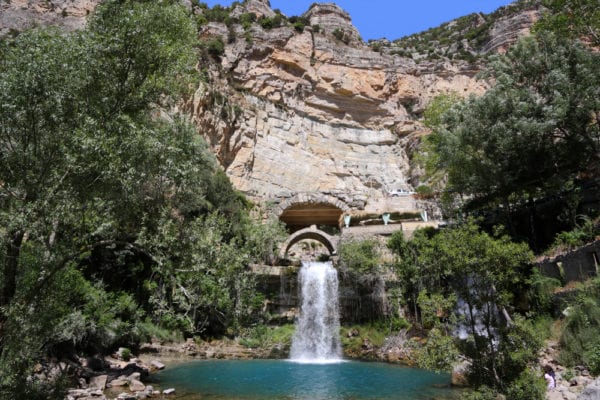Inspiration for Aphrodite’s Tears at the Afqa waterfall, Lebanon
Inspiration for Aphrodite’s Tears at the Afqa waterfall, Lebanon
Inspiration for Aphrodite’s Tears at the Afqa waterfall, Lebanon
-
Hannah
-
Hannah

November is an exciting month for me. My novel Indiscretion, which won a Gold Medal for Romance at the IBPA Benjamin Franklin Awards and Best Romance at the USA Best Book Awards, has already been translated into Macedonian, and this month the Arabic edition of the book is being launched at the Sharjah International Book Fair – one of the largest book fairs in the world, and the most prestigious in the Arab world. Here is the cover for the Arabic book:

Rahla Ila Bilad El Andalous, as Indiscretion is titled in Arabic, will be distributed in Sharjah, Abu Dhabi, Kuwait, Oman, Jordan, Saudi Arabia, Riyadh, Egypt, Algeria and Lebanon – countries with such beautiful landscapes, and rich cultures and mythologies and histories.
My Arabic publisher, Jarouss Press, is based in Lebanon. Did you know that archaeologists have found evidence of civilisation there dating back more than seven thousand years? Back in the BC period, this was the home of the Phoenicians, who had very close links to the Ancient Greeks – whose history and mythology features prominently in my latest book, Aphrodite’s Tears.
Indeed, it was a trip to the Afqa waterfall in Lebanon some years ago that sparked inspiration for the novel. The waterfall is nothing short of spectacular: from within the rocks the source of the river surges out and cascades down into the Adonis River.

According to mythology, this is where the mortal Adonis died in the arms of Aphrodite, goddess of love. So goes the story, Adonis and Aphrodite were in love, but then tragedy struck: while out hunting one day Adonis was gored by a wild boar (unleashed by the jealous Ares, god of war and another of Aphrodite’s lovers). Aphrodite could do nothing to save her mortal lover. Heartbroken, she held Adonis as he died, by the pool at the foot of the falls of Afqa.
Adonis’s blood poured into the river, staining the waters red. To this day, in springtime this red tinge can be seen in the water. It is, in fact, caused by reddish mud, but legend made this the blood of Adonis, marking the anniversary of his death.
The myth also tells of Aphrodite sobbing over her love, and her tears mingling with his blood to bring into being beautiful red flowers along the riverbanks: the scarlet anemones which bloom still each year in eternal remembrance of Adonis.
Nearby, the local people built a temple for Aphrodite. Only ruins remain there now, but one can imagine why, for so many centuries, people made the journey to this sacred place, to honour the goddess Aphrodite and all for which she stood.
But the legacy of Adonis extended far beyond Lebanon. Across the Ancient Greek civilisation, women would mourn the loss of Adonis in the midsummer Adonia festival. They would fill pots with little plants, but then set them outside in the sun to die – which would trigger public displays of grief like howling and sobbing and beating their breasts.
Today, ‘Adonis’ has come to mean a very virile, masculine, handsome man. ‘He had a strong masculine face,’ I write in Aphrodite’s Tears, ‘rather insolent and somewhat primitive – so much so that despite the tinge of fear fluttering through her, Oriel couldn’t help but feel mesmerized by this Adonis.’
For a long time, though, Adonis stood for love – and loss. When I stood before the thunderous falls at Afqa and saw the red-washed river of tears, I was struck by the depth of Aphrodite’s love. Losing Adonis had brought her such pain, and yet the love was worth the pain; the love endured.
That, I thought, is a depth of love to inspire. That is how to love.